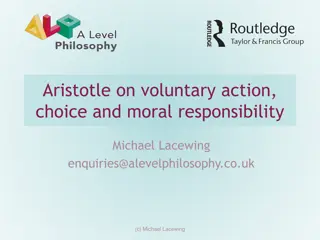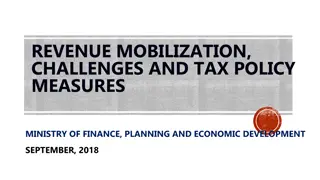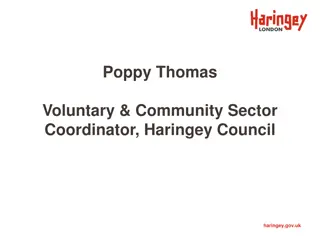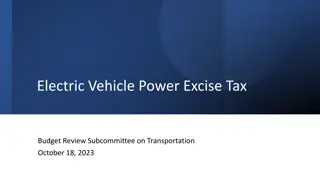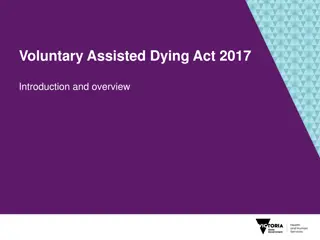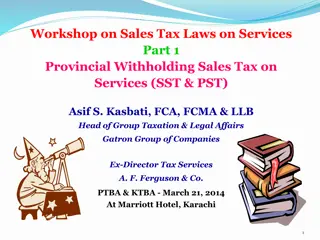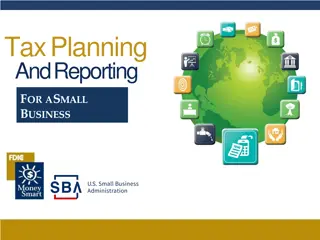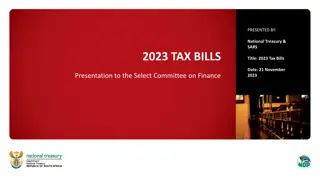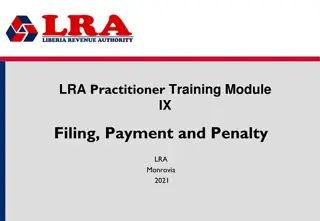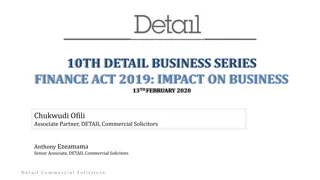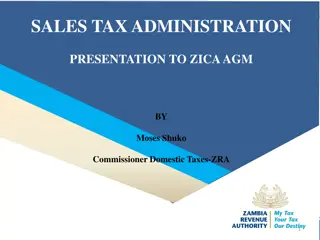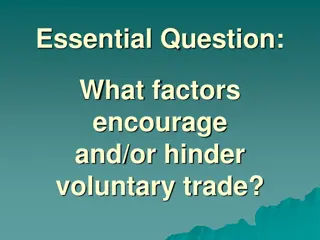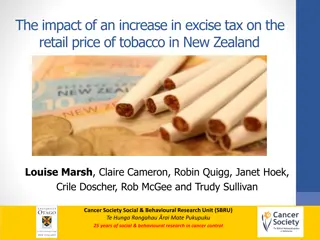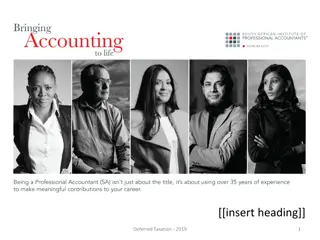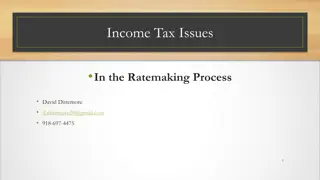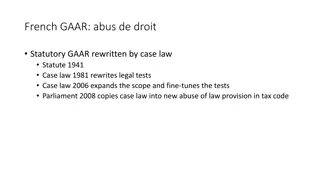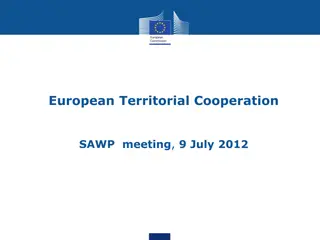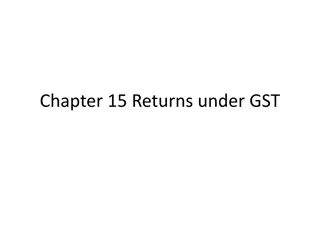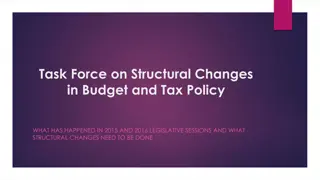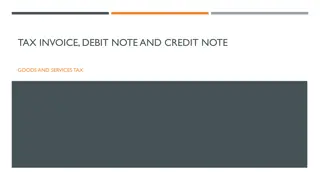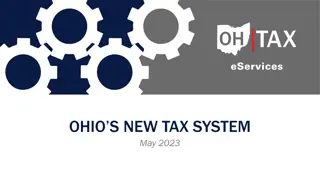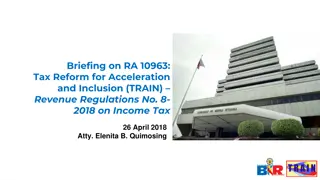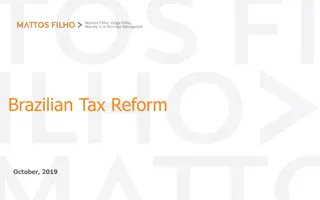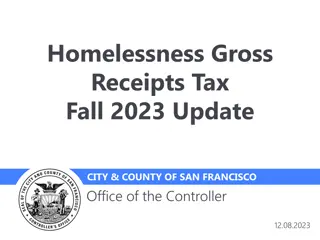Enhancing Voluntary Tax Compliance: A Case Study of Cooperation Between DIAN and Skatteverket
Exploring the collaborative efforts between DIAN and Skatteverket in promoting voluntary tax compliance, this presentation showcases the organizational structure, autonomy, and trust factors in tax systems. It delves into the societal perception of trustworthiness and examines the transition from enforcement-focused approaches to client-oriented services in the tax administration sector over three decades.
Download Presentation

Please find below an Image/Link to download the presentation.
The content on the website is provided AS IS for your information and personal use only. It may not be sold, licensed, or shared on other websites without obtaining consent from the author. Download presentation by click this link. If you encounter any issues during the download, it is possible that the publisher has removed the file from their server.
E N D
Presentation Transcript
Voluntary tax compliance Cooperation between DIAN and Skatteverket Anders Stridh & Lennart Wittberg, 1 5 June 2015
Skatteverket and the Swedish culture
Skatteverket Advisory Council Commissioner Internal auditors IT- Administrative department Legal department Tax Finance department Communication department department department Region Large taxpayer Region Middle Region North Region Stockholm Region South Region West Region East 10 500 employees 170 billion Euros in total tax revenue 3
Steering structure Parliament Government Ministry of finance Skatteverket Government agencies in Sweden have a high degree of autonomy 4
Generally speaking, would you say that most people can be trusted or that you need to be very careful in dealing with people? Baserat p World Value Survey
Generally speaking, would you say that most people can be trusted or that you need to be very careful in dealing with people? Baserat p World Value Survey
From cops against robbers to service for clients in 30 years
The development of the Swedish Tax Agency 1970 1980 1990 2000 2010 Right from the start Enforcement Service Balance between enforcement and service Right from the start Trust Trust Focus on environment Taxpayer focus
Strategic direction of the Swedish Tax Agency Implemented 2006, updated 2012 Vision A society where everyone is willing to do their fair share Contributions We nurture the willingness to comply We earn the trust of the taxpayers We are working to ensure that all pay the right amount We make it easier and smoother to comply Active Trustworthy Helpful
Voluntary compliance is the goal Cheap taxes Voluntary compliance 90% + Expensive taxes Enforcement 1-2% + Lost taxes Tax gap 8-9% Theoretical correct tax
Strategy - main content Respect Right from the start Easy to comply and difficult not to comply Prevent, support and automate Cooperation Attractive employer
The tax agency is successful in finding hidden income Businesses love the tax man The tax agency has the strongest brand Swedes love the tax agency even with the second highest tax burden in the world, how is that possible? H gsta ServiceScore 2012, 2013 och 2014 Skatteverket r den mest servicev nliga myndigheten - i klass med de b sta privata f retagen!
Trust in some mayor Swedish government agencies Tax Social insurance Migration Employment
Jag har frtroende fr Skatteverket I trust the tax agency 100% 3 8 12 90% 23 80% 70% Inst mmer ej Don t agree 60% 50% 83 Varken eller Neither 40% 68 30% Inst mmer Agree 20% Ingen uppfattning No opnion 10% 1 2 0% 2006 2012 21 Private individuals 2012
I am treated well by the staff at the tax agency I am treated well by the staff at the tax agency Don t agree Don t agree Neither Agree Agree Businesses 2013
If possible, I would hide income from taxation I would Neither I would not No opinion 23 Private individuals 2012
The tax agency is good at combating tax evasion No Neither Yes No opinion Private individuals 2012
Right from the start The new focus The old focus Business Bookkeeping Tax return Payment Right from the start = early measures
Right from the start The new focus The old focus Business Bookkeeping Tax return Payment Certified cash registers Staff ledgers Bookkeeping checks Fewer comprehensive field audits
Cash register Introduced 2010 Certified cash registers All trade with cash for selling of goods and services Cards (Visa etc) equal cash Spot checks (unannounced) Check if certified cash register is in place and receipts given to customers 1000 fine if not
Staff ledgers - Restaurants and hair dressers Introduced 2007 All traders must keep a ledger Employees in/out Spot checks (unannounced) Check if employees noted in ledger 1000 fine if not
Some milestones in OECD tax compliance work Understand and influence behaviour Selection for audit Risk Right from the start Involving and engaging management Dealing mostly with tax returns Dealing with taxpayers environment
Right from the start is: A compliance approach About influencing taxpayers environment About what is happening before the tax return is filed Described in four dimensions: Acting in real time and up-front Focusing on end to end processes Making it easy to comply Involving taxpayers and other stakeholders
Compliance approach, summary More system measures One-to-many Focus on increasing the willingness to comply Focus on building trust Focus on treating all taxpayers with respect One-to-one Early measures (more upstream) Before During After
NORMS Personal norms Social norms Descriptive social norms (what others do) Prescriptive social norms (what others think)
Ice-cream in the office! Put your Money here
Passers-by % Non-littering Littering 60 54 50 40 32 30 20 14 6 10 0 Environment Clean Littered
Ingroup We Outgroup Them
Social norms of ingroup Internalised personal norms Behaviour Possible to influence Difficult to influence
Universal principles to influence norms (Cialdini) Reciprocity: People tend to return a favor Commitment: People that commit are more likely to follow through Social proof: People will do things that they see others do Authority: People tend to obey authority figures Liking: People are easily persuaded by people they like
Example from research Using social norms to influence behaviour Hotel Re-use of towels Reminder of towel use in regards to Base Message the environment Combined base message with 75% of guests in this hotel reuse their towels What other people do 26% increase Combined base message with 75% of guests in this room reused their towels 33% increase What other people 'like me' do 4 2
How to use social norms? Always be honest Describe the desired behaviour ('you should pay your taxes on time') Tell what most people do ('most people comply') If you can't use what most people do, then you can describe an increase in positive behaviour. Tell what significant people do ( movie star X or athlete Y comply ) Tell what 'people like you' do ('most people in Bogota comply')
Change in social norms in Sweden I would evade tax if I had the opportunity Yes Maybe No Don t know 44
Why do people comply with rules? Because they want to or because they are forced to?
We can, and should, influence the reason why people obey rules Do we want it to be: 1. Because they believe it is the right thing to do (=personal norms) 2. Because they feel compelled to do it due to external incentives (= sanctions)
Kindergarten Some parents are coming too late Moral conviction Penalty introduced More parents are coming too late External pressure Penalty removed Even more parents are coming too late Nothing
Why do we obey rules? Incentives No incentives Want Self interest Moral convictions Don t want Exernal pressure Goes with the flow Self interest works best
External pressure (incentives) can increase or decrease the individuals own moral convictions. The moral conviction will decrease if the incentives are perceived to be controlling. The moral conviction will increase if the incentives are perceived to be supportive.




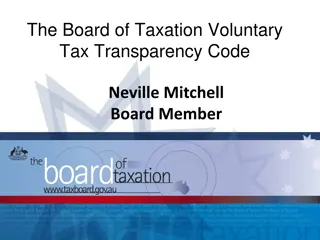
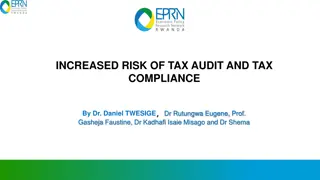
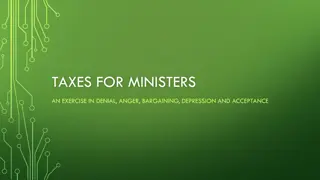
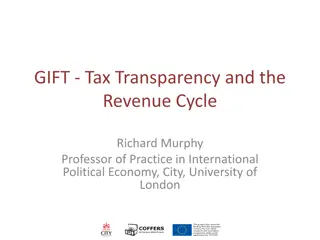


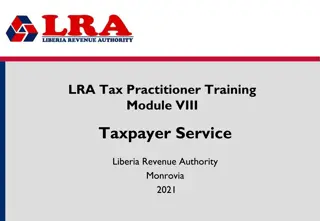

![Town of [Town Name] Real Estate Tax Rates and FY 2024 Budget Summary](/thumb/62211/town-of-town-name-real-estate-tax-rates-and-fy-2024-budget-summary.jpg)

